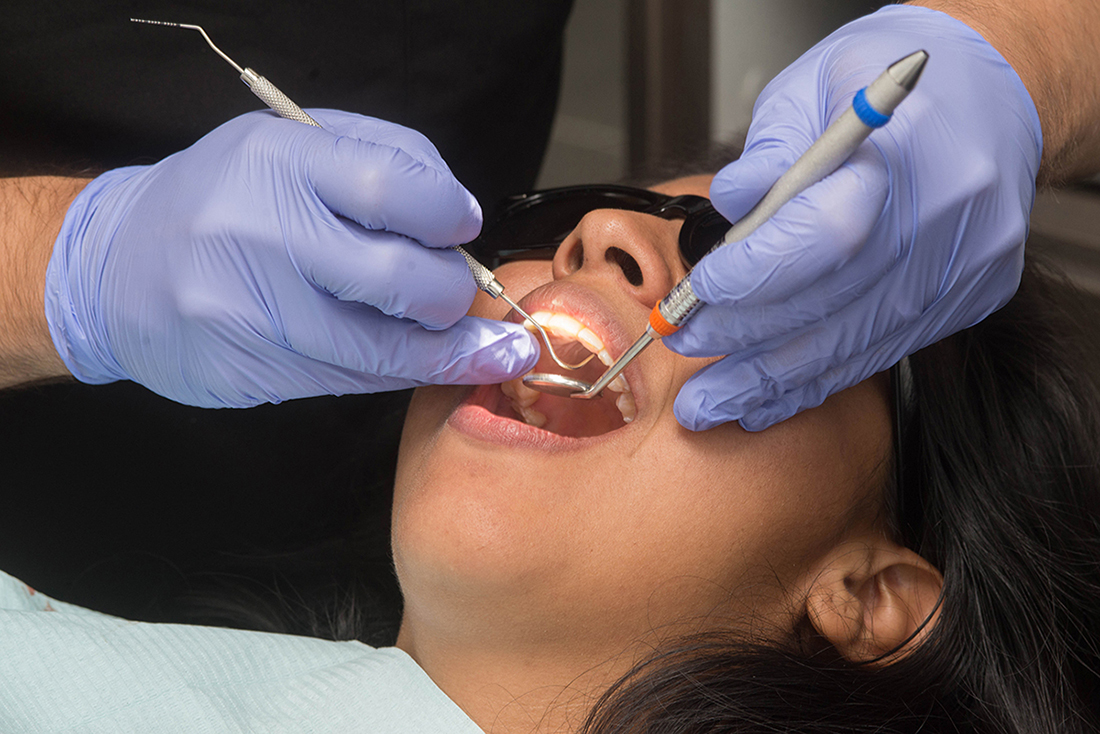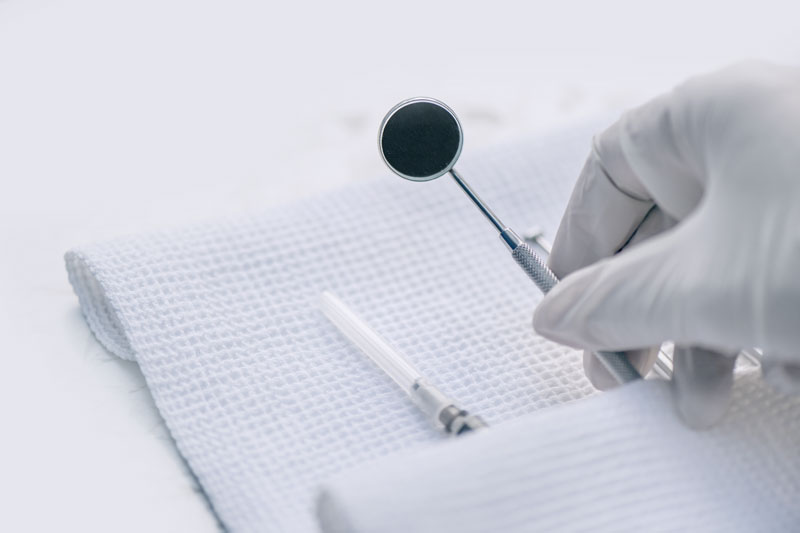Periodontitis
Are your gums swollen and puffy? Do your gums bleed when you brush your teeth? Do your gums seem to be receding further, thereby exposing your teeth even more? If so, you may suffer from a dangerous gum disease called periodontitis. Gingivitis, an infection of the gums, is the beginning of periodontitis. When you brush or floss your teeth, your gums may bleed, which is one of the early symptoms of gingivitis. This disease is dangerous and can lead to bone loss and tooth loss if it’s not treated in time. If you notice any signs and symptoms of periodontitis, consult URBN Dental in Midtown or Uptown periodontitis Houston immediately for diagnosis and Periodontitis Treatment.
What is Periodontitis?
Periodontitis is an advanced gum disease characterized by inflamed gums and infected support structures and teeth. This disease is caused by periodontal bacteria that infect your teeth and gums. Additionally, you can observe some tooth discoloration, known as plaque. On your teeth, plaque is a deposit of germs and food particles. Although germs exist in your mouth all the time, they only cause problems when their numbers substantially grow. This could occur if you don’t regularly floss, brush your teeth, or undergo dental cleanings. The inflammation, redness, and swelling you experience is actually the body’s defense response to the presence of these bacteria. However, even though these are your body’s warning signs, they can also be dangerous.

Periodontitis Causes
A healthy mouth usually hosts over 700 species of bacteria, all of which are harmless in controlled numbers. However, if you don’t clean your teeth thoroughly enough, or if you don’t go for regular dental cleaning appointments, the food particles stuck in your mouth turn to plaque, which is a sticky substance that invites more bacteria. Over time, the plaque hardens into tartar, which is almost impossible to remove with simple brushing and invites even more bacteria. In this case, the accumulation of plaque and tartar leads to increased bacteria infestation. These bacteria gradually inflame the gums and lead to the formation of periodontal pockets. This is how periodontitis occurs and spreads through your mouth. With early diagnosis and treatment, you can stop periodontitis in its early stage. Treatment is frequently highly effective. A dentist must continually monitor periodontitis to prevent further development of the condition. For a successful outcome, you’ll need to modify your dental hygiene practices and fully comply with your dentist’s recommendations.
Periodontitis Symptoms
Periodontitis is one of the final stages of gum disease. By the time you have periodontitis, you will have come across several symptoms of gum disease:
- Swollen gums.
- Bright red gums with inflammation.
- Sensitive gums that bleed easily.
- Receding gums.
- Development of pockets between your teeth and gums.
- Formation of pus in your gums.
- Persistent bad breath.
- Loose teeth.
How Soon Should I Seek Help in Case of a Dental Emergency?
Unless you are a dental professional yourself, you cannot tell whether a certain delay can result in unacceptable damage or not. Therefore, act without delay. Even a small delay can result in serious, irreversible loss. Broken teeth cannot be grown again. Rush to your dentist for a physical examination, or if that is not possible in a short time, contact one on the telephone to seek advice. After listening to your description, of your periodontitis treatment Houston dentist may advise you to act immediately or give you an appointment.
Periodontitis Treatment
You need to consult your walk-in dentist immediately when you notice any of the signs above or symptoms of periodontitis. Ideally, you should have consulted the doctor when you first started noticing signs of gingivitis (the initial stage of gum disease. However, it’s still not too late.
Periodontitis treatment will start with a thorough clinical examination. The dental hygienist will examine your teeth and gums to detect the spread of the disease. Periodontitis affects the bones underneath the gums. As such, the dentist will also run x-ray scans to detect the damage caused to your bones, teeth, or jawbone. The x-ray will also help identify the depth of gum pockets.
During the first stage of the treatment, the dental hygienist will clean out the gum pockets to prevent the disease from spreading. If the periodontitis hasn’t spread too far, you can treat it using non-surgical, minimally-invasive treatments, including scaling and root planing.
During the scaling procedure, the doctor will use a scalar device to extract and remove every last trace of plaque and tartar from your teeth and the gum line. Following this, the root planing procedure will smoothen out the teeth’ surface so that the doctor can reattach the teeth to receding gums. They will also remove all plaque and tartar from the gum line to eliminate any further risk of bacterial decay. The doctor may also prescribe some antibiotics to deal with the bacterial infection.
If your teeth don’t respond to the non-invasive, non-surgical treatment, then the doctor may need to conduct a corrective surgical treatment. However, this is a last-resort scenario. Approach the doctor at the initial stages of the disease. They’ll be able to treat you completely with those above minimally-invasive non-surgical procedure that causes minimal pain or discomfort.

What Happens if I Don’t Treat Periodontitis?
Periodontitis is one of the most dangerous gum diseases. If you don’t treat periodontitis in time, it can lead to complete bone loss and tooth decay. Over time, the situation may get so bad that your only options are root canal treatment or dental extraction. This can lead to complete tooth loss. Research also suggests that periodontal bacteria can enter your bloodstream and wreak havoc on your heart, lungs, and other body parts, leading to several other diseases like rheumatoid arthritis, strokes, coronary artery disease, and various others.
Periodontitis Prevention
Your doctor will give you a thorough set of instructions on how to prevent periodontitis completely. You should follow their instructions to the letter. In addition to those, you should also follow these preventative tips to maintain perfect oral health.
- Brush your teeth every morning and night using an abrasive toothpaste.
- Floss after every meal using the technique shown by your dentist.
- Ask your dentist to recommend an antibacterial mouthwash with which you can rinse your mouth regularly.
- You should go for dental cleaning appointments at least once every 3 to 6 months. The dental hygienist will be able to get rid of plaque and tartar that’s left over in your mouth.
- You should avoid chocolates and other sweets because they invite bacterial growth and infections.
- Tobacco consumption is one of the primary causes of gum diseases so you should limit your consumption or stop altogether.
- If you notice any signs of gum disease — swollen gums, redness, bleeding gums, etc — visit your dentist immediately. These could very well be initial warning signs of gingivitis so it’s best to treat them before they advance to periodontitis.




